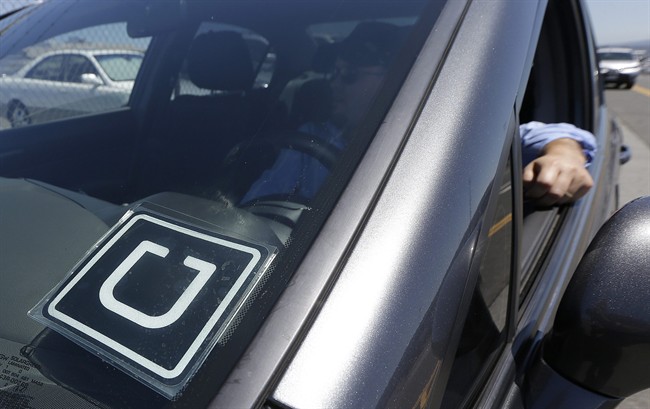Another insurance company has already set the wheels in motion to bring ride-sharing insurance options to drivers in Alberta.

Aviva Canada has developed coverage for drivers who carry paying passengers in their own vehicles. It will be available to drivers in Ontario this month, and the Ontario regulator approved the product Tuesday.
READ MORE: Ontario insurance regulator approves coverage for Uber drivers in Canadian ‘first’
The company is also in discussions to offer coverage out west.
“We are absolutely keen – and have intentions to come to Alberta,” senior vice president Jason Storah said, adding Aviva would like to offer coverage in any city where customers need it.
On Jan. 26, Edmonton city council passed a bylaw that will make ride-sharing companies like Uber legal. The move was the first of its kind in Canada.
City council became the first Canadian city to legislate ride-sharing. The new bylaw will come into effect March 1. However, in order to operate legally, drivers still must have appropriate insurance coverage.
READ MORE: Edmonton becomes first city in Canada to legislate ride sharing
“We made this decision based on the current environment,” Storah said.
Aviva was responding to the growing use of ride-sharing services and the need to protect both passengers and drivers, the company explained. Storah said there was a need for clarity when it came to insurance.
- Invasive strep: ‘Don’t wait’ to seek care, N.S. woman warns on long road to recovery
- Canadian food banks are on the brink: ‘This is not a sustainable situation’
- Is home ownership only for the rich now? 80% say yes in new poll
- ‘Super lice’ are becoming more resistant to chemical shampoos. What to use instead
“When consumer needs change, we must evolve our insurance solutions to respond,” Aviva president and CEO, Greg Somerville, said. “We’re excited to offer a simple and affordable solution.”
Storah said the cost of insurance would vary depending on factors like the driver’s experience, driving history and type of vehicle.
He stressed the cost wouldn’t be prohibitive for those who didn’t pick up fares often. In fact, the coverage was created for those who spend a maximum of 20 hours a week ride sharing.
“This is an affordable solution for ride-sharing for people doing it on a part-time basis,” he said.
READ MORE: Intact insurance working with Uber on new products for ride sharing
Intact is also working on a ride-sharing insurance product.
Aviva believes more options mean healthy competition and market practice.
“It’s always good when customers have choice,” Storah said.
Uber issued a statement to Global News Monday night, indicating the interest from another insurance provider is a promising development.
“We are encouraged to see a growing number of Canada’s insurers show interest in innovation in the transportation space,” the email read. “Uber and Intact have been working with provincial regulators for a number of months and Intact has completed their full submission for approval. As of yet, we have not reviewed the details of the new insurance policy proposed by Aviva.”
READ MORE: Auto insurance industry changing because ride sharing ‘is here to to stay’
While Aviva has already had preliminary talks with the Alberta regulator, there are still a few steps to go before ride-sharing insurance is available. The company must have more formal discussions with the regulator and then submit an official proposal. The entire process – from start to finish – could take anywhere from a few weeks to several months.
In Ontario, it took a couple of months, Storah said.
When asked about the Ontario regulator’s approval, Edmonton’s mayor said Alberta was “reviewing submissions” but didn’t have a timeline for when ride-sharing insurance could be available in the province.
“Hopefully that can be a template for Alberta provincial government consideration,” Don Iveson said. “But really, that’s between them, but I encourage them to resolve that speedily so that we can register people lawfully and fully under the bylaw.”




Comments